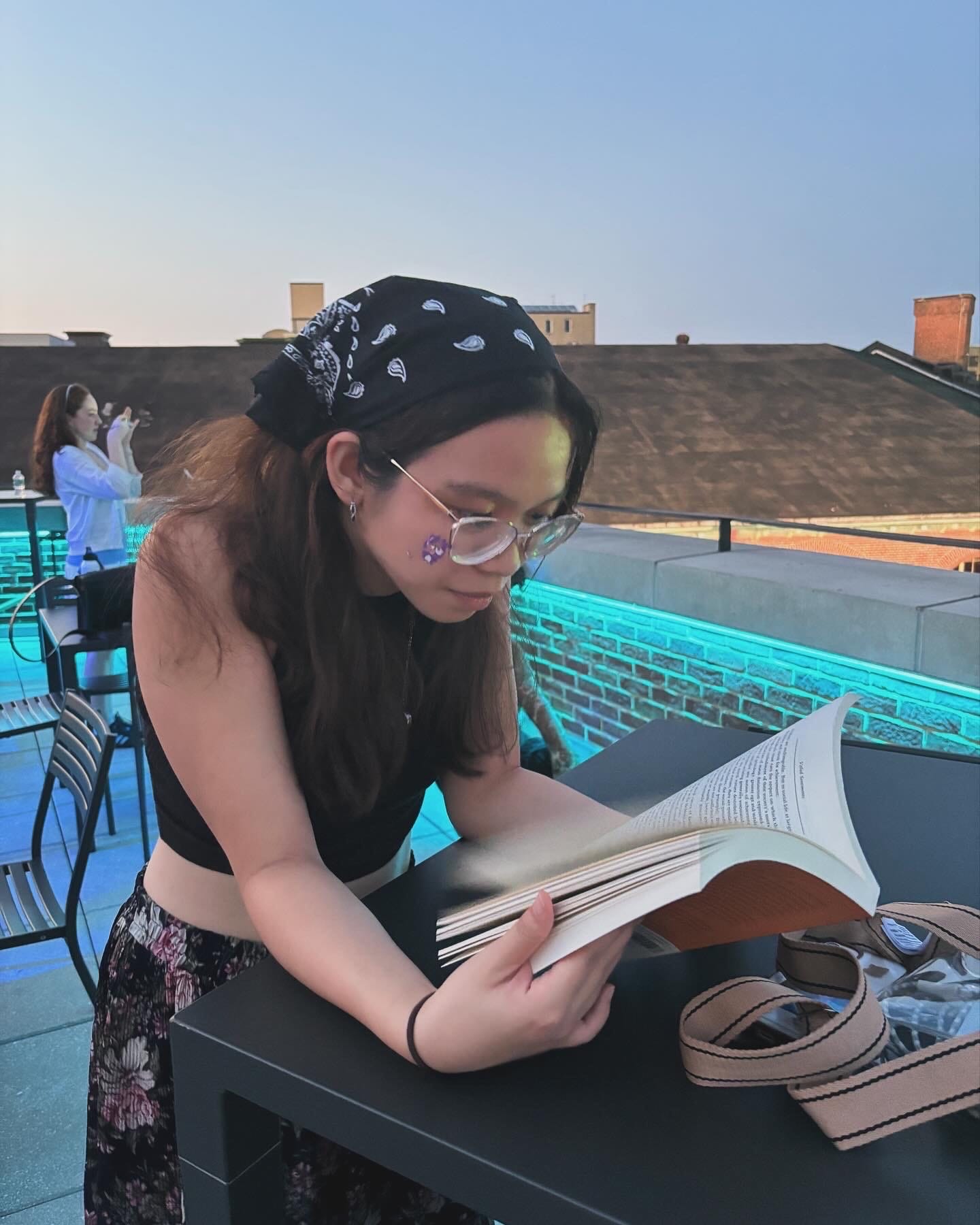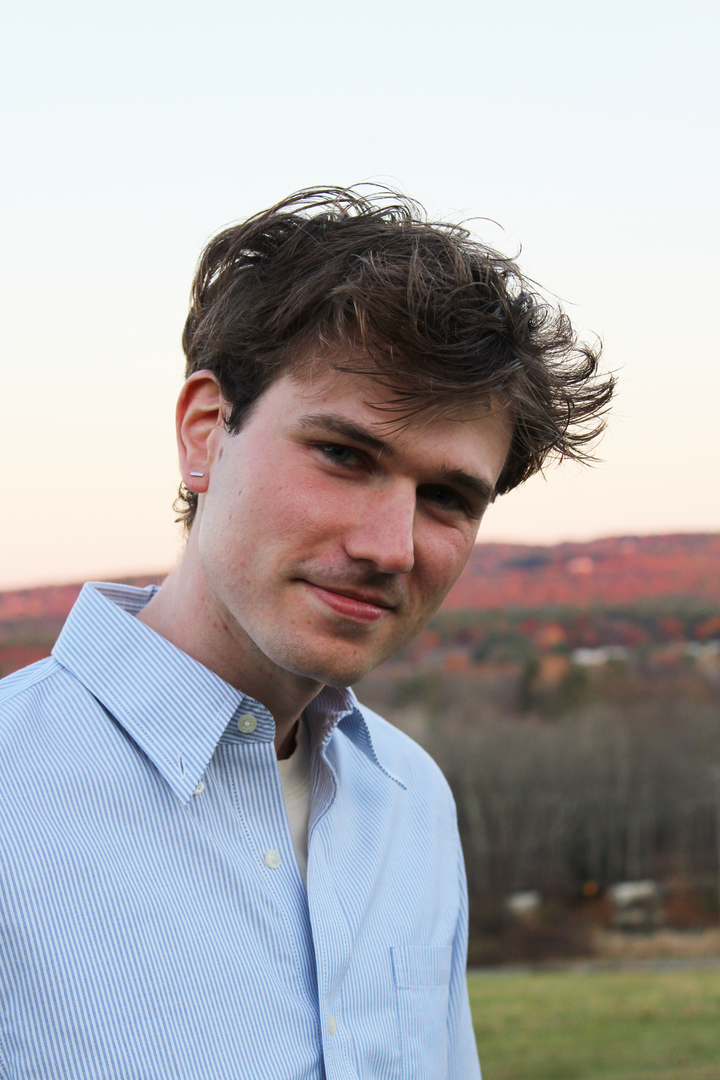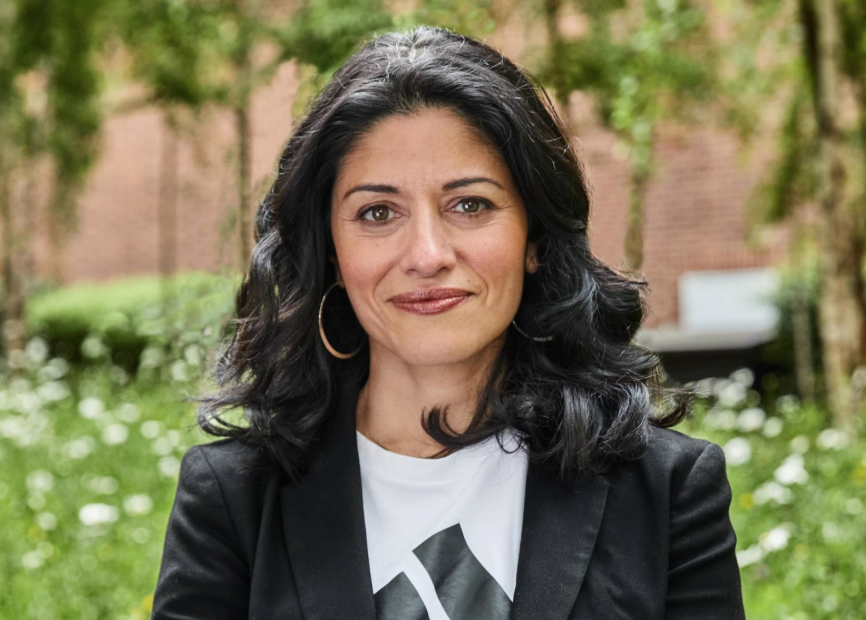Gabby Avena: A Kind of Knowing
Anyone who encounters Gabby Avena will be instantly struck by her genuine warmth, her ability to listen intently, and the way she makes every conversation feel both meaningful and inspiring.

When people talk about Gabby Avena ’25, it’s often with a kind of admiration and reverence. “She’s one of the most compassionate people I’ve ever met,” said Charlie Odulio ’26. “Even when we were talking over FaceTime from abroad, I could feel how intentional she was. She’s one of the smartest, most eloquent people I know.” Sarah Wu ’25 echoed this admiration: “She's so deliberate. I've never met someone who reads papers as methodically and analytically as she does.”
Avena’s influence on Amherst’s intellectual, activist, and creative life is hard to overstate. An English and Asian American and Pacific Islander (AAPI) studies double major, Avena has been a driving force in the student-led push for an AAPI studies major, a community archivist, and the editor-in-chief who reimagined The Indicator, Amherst’s literary magazine. Her work combines literary scholarship with community building, archival labor with creative writing, and always, always, a commitment to justice. Her ethos might be best described as a kind of knowing — grounded in care, in history, and in imagining better futures.
Rooted in Driftwood
Avena was born in New Jersey but grew up in Driftwood, Texas, a small town just outside Austin, often described as the “gateway to the Hill Country.” The area has changed over time, becoming increasingly suburbanized and home to upper-middle-class transplants. “It’s a mix of locals and newcomers now,” Avena explained. “But when I was growing up, it was mostly white, and Asian Americans weren’t really part of the landscape in the way people might expect.”
Indeed, growing up Filipino-American in Driftwood meant navigating a place where racial difference was often misunderstood or ignored. Many of the Asian American peers Avena encountered were adopted or mixed-race, and she recalled explicit racism as a common occurrence.
Still, she found refuge and solace in books. A self-described “big book nerd,” Avena was hooked on storytelling from an early age. “I did Accelerated Reader, Battle of the Books, all of it,” she laughed. “My parents would threaten to take away my books as punishment.”
In high school, her love for literature became something more structured. Avena joined the literary magazine, participated in academic University Interscholastic League (UIL) events like Literary Criticism and Ready Writing, and found joy in parsing texts. “The more you talk about a story, the more comes out of it,” she reflected. “That’s when the story really comes alive.”

Choosing Possibility
Given the expectation in Texas that high-performing students would go to public schools through the state’s top 10% rule, Avena assumed she’d end up at the University of Texas at Austin. As the second oldest of four siblings, she played a major caregiving role in her household and didn’t initially prioritize college planning. “I was kind of a second mom,” she said. “I didn’t think too hard about college. I was just doing what needed to be done.”
But something shifted. She applied to just two schools — and one of them was Amherst College. “I looked at the best English programs,” she said. Amherst’s literary lineage, especially its association with Robert Frost and its small class sizes, drew her in. So did its financial aid. “Amherst gave me the support I needed,” Avena explained. “It made it possible.”
It wasn’t an easy move. Leaving Texas meant leaving behind the siblings she helped raise. “It was hard for my family,” she said. “Not being there as they grew up, that’s still hard.”
But coming to Amherst opened up possibilities. “I came here wanting to study English,” Avena said. “But I was also interested in the stories that weren’t always told.”
An Archive of Activism
Avena’s first year at Amherst was marked by curiosity and clarity. One formative experience came in Assistant Professor of History and Sexuality, Women's and Gender Studies Christine Peralta’s “Asian American History” class, which she took in her first semester. “That class changed everything,” Avena said. “It gave me a language for the things I’d experienced — and for what I wanted to study.”
Around the same time, she began working at the Amherst College Archives and Special Collections. Assigned to process boxes from the history of student activism, Avena quickly found herself immersed in a deeper institutional narrative. “For my midterm, I wanted to write about the San Francisco State University strike,” she said, referring to the 1968 student-led protests that gave rise to ethnic studies. “I thought, why not look at what Amherst’s own archives had to say?”
What she found stunned her. “There were decades of student activism around Asian American studies — and yet so little had changed,” Avena said. She spent months organizing the boxes, eventually creating a guide to help future researchers understand the timeline of Asian American history using the documentation of Amherst’s own history. The project became a foundation for her broader work — both scholarly and activist.
Blueprints for Belonging
By her sophomore year, Avena was no longer just studying institutional history — she was making it. Along with other students, Avena’s advocacy for the creation of the AAPI major at Amherst was just one example of her commitment to building community. “She wasn’t just dreaming,” Wu said. “She was organizing. She took meeting notes, planned events, and made sure people had the tools to keep going.” This included drafting an open letter, hosting workshops on affirmative action in collaboration with student groups like the Asian Students Association [ASA], and connecting with faculty.
Avena downplays her role in the creation of the major, but the facts speak otherwise. She had already taken most of the necessary courses before the major was officially approved, simply by following her intellectual interests. “It wasn’t planned,” she said. “I just chased what I was interested in.”
That path of interest — courses in history, ethnic studies, literature — led her to help shape the requirements of a major that didn’t yet exist. Now, Avena will graduate as one of the first AAPI studies majors in Amherst history.
Writing Through Relation
For her senior thesis in the English department, Avena pursued a project that sits at the intersection of literature, ethnic studies, and decolonial theory. “I always wanted to do something interdisciplinary,” she said. “This felt like the culmination of everything I’d been working on.”
Her thesis explores aspects of Filipino relationality — the ways Filipino authors and thinkers understand identity through relationships, conflict, and solidarity. Drawing from postcolonial literature from 1940 to 2019, Avena analyzed texts that reflect on colonial trauma, diasporic identity, and the friction of solidarity across difference.
“Filipino identity is often stereotyped and approximated as Black, Latino, or Indigenous,” Avena said. “Not because Filipinos are those things, but because of the way racialization in the U.S. makes us legible through other communities’ experiences. That creates both potential for coalition and real tension.”
Her work engages with theories of fungibility from scholars like Saidiya Hartman, Afro-pessimism, and the legacy of Third World Liberation movements. “It’s not just about harmony,” she emphasized. “It’s about reckoning with the friction and violence that come with building community.”
Reading Like Feeling
Avena’s intellectual work draws from linguistics, history, and her own family’s experience. “What kind of intimacy does poetry allow?” Avena mused. “What does it mean to return to a word, again and again, and try to understand it differently each time?” This combination of scholarly rigor and emotional depth is what made her attentiveness while reading so compelling.
Her close friends recognized this unique approach early on. “She’s the most methodical reader I’ve ever met,” Wu said. “She has five different kinds of highlighters — light pink, pink, blue, light blue, green.” But as Wu pointed out, Avena’s method wasn’t about perfection. “It’s about paying attention,” she said. “Gabby’s attention to detail is about caring deeply for what she’s reading.”
Avena’s creative work also grew more experimental, more playful, even in class. “While most of us were writing personal essays, Gabby was doing this hybrid creative-critical thing,” Wu recalled. “She was unafraid to take risks.” As Avena’s writing evolved, it began to weave in tenderness, humor, and risk. “She started making space for silly things in her poetry,” Wu laughed. “Now I can read something and just know — this is Gabby’s. Her poems are like these carefully stacked sculptures.”
Remaking the Page
Avena’s influence extended into Amherst’s creative spaces as well. As editor-in-chief of The Indicator, she helped redesign the magazine not just visually, but philosophically.
“She redesigned the whole thing,” Wu said. “She had experience with Adobe InDesign and layout from high school, but more than that, she gave the magazine a new voice.”
Under Avena’s leadership, The Indicator shifted from a primarily news and opinion collection to a more artistic and community-focused publication. Issues began to include personal essays, visual art, and work that combined creative and personal expression.
She’s been published in The Indicator and The Amherst Student multiple times, often writing on themes of memory, family, and identity. “Publishing is only part of it,” she said. “I wanted it to be a space where people could find their voices.”
Community and Care
Throughout her time at Amherst, Avena has also built spaces that reflect her values. In the archives, she created guides to help other students navigate the college’s collections. In the English department, she helped organize community events, including poetry readings and peer writing groups. She also curated a library exhibition on the history of student activism, ensuring that Amherst’s future scholars have access to the past.
Her commitment to care is visible in her friendships, too. One of the most remarkable things about Avena is how much she has shaped other people. “She’s one of the most compassionate people I’ve ever met,” Odulio said. “Even when we were talking over FaceTime from abroad, I could feel how intentional she was.” He smiled. “She’s one of the smartest, most eloquent people I know.”
But for Odulio, what truly sets Avena apart is her deep, empathetic curiosity. “She cares about people’s lives,” he said. “She wants to know what you love, what you notice, what moves you.”
Odulio said that getting to form friendships in the workplace was intimidating at first. But Avena quickly put him at ease. What started as fleeting interactions between the shelves grew into a lasting connection. He recalled how, Avena “always asked the kind of questions that show she’s really listening and really cares. That she wants to know what you care about.”
Wu agreed. “Whenever I’m stressed, I go to Gabby for advice. She’s a very good listener, and she is always willing to sit down and make time for you.”
Those who know Avena believe that she will continue to make a profound impact, no matter where she goes. “She’s going to be one of those cool professors,” Wu said. “The kind who still knows how to laugh and be real. The kind who makes you believe in what learning can be.” Odulio agreed: “Gabby makes you want to love the world a little more. And I think a lot of people are going to be thankful to know her.”
When I asked Avena what she’ll miss most about Amherst, she paused for a moment. “I think I’ll miss the kind of conversations that happen when you’re not trying to sound smart. When you’re just trying to be honest. The small moments when someone shows you how they see the world — and you get to carry that with you.”
Toward New Futures
Avena has carried many stories during her time at Amherst — stories from the archives, from her community, from poetry, and from her friends. And she has carried them all thoughtfully.
As Avena prepares to graduate, her legacy at Amherst is not only in the archives she organized, the major she helped build, or the magazine she transformed — though each of those achievements would be impressive on their own. It’s in the lives she’s touched, the conversations she’s deepened, and the care she’s extended across classrooms, communities, and friendships. Her work has always been more than academic — it’s relational, political, and grounded in a deep belief that storytelling can heal, resist, and reimagine.
In every highlight, every poem, every carefully stacked sentence, Avena has modeled a different way of knowing that insists knowledge must be felt, shared, and lived. As she looks ahead to new chapters, those she’s worked with and cared for will carry that knowing forward.





Comments ()